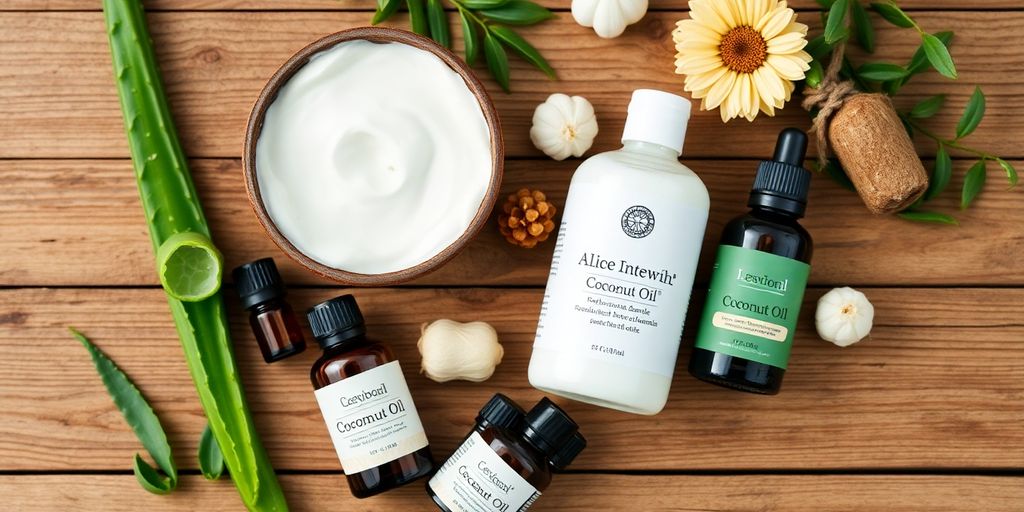When it comes to skincare, many of us are on a quest for the best products that won’t break the bank or harm our skin. The clean beauty movement has gained traction, leading to a flood of products boasting labels like “100% natural” or “chemical-free.” But does that really mean they’re better for your skin? Today, we’re tackling the myths surrounding natural beauty products and uncovering the facts behind what truly works for your skin.
Key Takeaways
- Natural doesn’t always mean safe; some natural ingredients can irritate skin.
- Everything is made of chemicals, including natural ingredients; look for harmful ones instead.
- Organic ingredients aren’t always more potent; the formulation matters more.
- Effective skincare often blends natural and synthetic ingredients for the best results.
- Research ingredients before trying new products to ensure they meet your skin’s needs.
Understanding The Clean Beauty Trend
The Rise of Natural Products
Okay, so natural products are everywhere these days. It feels like every other ad is pushing something “natural” or “organic.” But what’s really behind this surge? Well, a lot of it comes down to people wanting to know exactly what they’re putting on their skin. There’s a growing distrust of big corporations and a desire to get back to basics. People are actively seeking alternatives, and natural products seem like a safe bet. Plus, social media plays a huge role. Influencers are constantly promoting natural skincare routines, and that definitely drives sales.
Consumer Perceptions of Clean Beauty
Consumer perception of “clean beauty” is super interesting because it’s not exactly based on facts. For many, “clean” equals “safe” and “healthy.” They think that if a product is labeled as clean, it must be good for them and the environment. But the truth is, the term “clean beauty” is pretty vague. There’s no real regulation around it, so companies can kind of define it however they want. This leads to a lot of confusion and, honestly, some misleading marketing. People are willing to pay more for products they believe are better, even if there’s no solid evidence to back it up. It’s all about the feeling of safety and well-being.
The Role of Marketing in Skincare
Marketing plays a HUGE role in the skincare industry. I mean, think about it: how many times have you bought a product because of a catchy slogan or a celebrity endorsement? Companies are masters at creating desire and tapping into our insecurities. They use words like “natural,” “pure,” and “organic” to make their products seem more appealing, even if those words don’t really mean anything. Ingredient transparency is key, but often overlooked. It’s all about creating a narrative that resonates with consumers. The clean beauty movement is evolving, and we can expect stricter regulations around what can be labeled as “clean.” Brands will need to be more transparent about their ingredient sourcing, manufacturing processes, and environmental impact.
It’s important to remember that marketing is designed to sell you something. Don’t just blindly believe everything you see and hear. Do your own research, read reviews, and talk to experts before making a purchase. Your skin (and your wallet) will thank you.
Myth: Natural Ingredients Are Always Safer
The Reality of Allergic Reactions
It’s easy to assume that anything from nature is automatically gentle and safe for our skin. After all, what could be more wholesome than something straight from the earth? But here’s the thing: natural doesn’t always equal safe. Think about poison ivy – totally natural, but definitely not something you want to rub on your face! Allergic reactions can happen with natural ingredients just as easily as with synthetic ones. It really boils down to individual sensitivity and how your skin reacts.
Examples of Irritating Natural Ingredients
Some natural ingredients are known culprits when it comes to skin irritation. Essential oils, for example, are often touted for their benefits, but they can be highly concentrated and cause sensitivity, especially in those with already sensitive skin. Citrus oils, while smelling amazing, can increase your skin’s sun sensitivity, making you more prone to sunburn. Other natural ingredients like certain resins or plant extracts can also trigger reactions in some people. It’s a good idea to patch-test any new product, even if it’s all-natural, to see how your skin responds.
Synthetic Ingredients and Safety
Synthetic ingredients often get a bad rap, but many are created with safety and stability in mind. In fact, some synthetic ingredients are designed to mimic the beneficial properties of natural ones, but with a more consistent and predictable effect. For example, hyaluronic acid, often created in a lab, is a hydration powerhouse. Retinoids, another common synthetic ingredient, are known for their anti-aging benefits. The key is to look for products that are transparent about their ingredients and have undergone testing to ensure safety and efficacy. It’s about choosing safe skincare ingredients, regardless of their origin.
It’s important to remember that the source of an ingredient doesn’t automatically determine its safety. Both natural and synthetic ingredients can be beneficial or harmful depending on the concentration, formulation, and individual skin type. Always do your research and pay attention to how your skin reacts to new products.
Myth: Chemical-Free Means Better
Defining Chemical-Free
Okay, so you’ve probably seen products boasting they’re “chemical-free.” But here’s the thing: everything is made of chemicals. Water? Chemical. Oxygen? Chemical. That fancy plant extract in your serum? Yep, still a chemical. The term is more of a marketing tactic than a scientific reality. It plays on the fear of the unknown, making people think that anything “chemical” is automatically bad. It’s just not true.
Understanding What Chemicals Are
Let’s break it down. A chemical is simply a substance consisting of matter. It’s not inherently good or bad. Some chemicals are harmful, sure, but others are essential for life. Think about it: your body is a complex mix of chemicals working together. In skincare, some synthetic chemicals are created in a lab to be more stable and effective than their natural counterparts. For example, lab-made ingredients like hyaluronic acid can be amazing for your skin.
The Importance of Ingredient Transparency
What you should really be looking for is ingredient transparency. Brands should be upfront about what’s in their products, whether it’s natural or synthetic. This allows you to make informed choices based on your skin’s needs and any sensitivities you might have. Don’t fall for the “chemical-free” trap. Instead, focus on understanding the ingredient list and researching what each ingredient does.
It’s about finding products that work for you, regardless of whether they’re 100% natural or a blend of natural and synthetic ingredients. Pay attention to how your skin reacts and choose products that give you the best results. Remember, skincare is personal, and what works for one person might not work for another.
Myth: Organic Skincare Is More Effective
The Misconception of Organic Potency
There’s this idea floating around that if something is organic, it automatically packs a bigger punch when it comes to skincare. But honestly, that’s not always the case. Effectiveness really boils down to how a product is formulated, not just where the ingredients come from. Think of it like cooking – using organic carrots doesn’t guarantee a better soup if the recipe is bad.
Formulation vs. Sourcing
It’s easy to get caught up in labels that scream “organic!” but what really matters is how those ingredients are put together. A well-formulated product, even with some synthetic ingredients, can often outperform a poorly formulated organic one. It’s all about the science behind the blend. For example, you might think that natural skincare products are always better, but that’s not necessarily true.
Examples of Effective Synthetic Ingredients
Some synthetic ingredients are actually more effective than their natural counterparts. Take Vitamin C, for instance. While you can get it from oranges, the most stable and effective form used in skincare is often created in a lab. This ensures it penetrates the skin better and doesn’t break down as easily. Here are some other examples:
- Peptides: Lab-created peptides can target specific skin concerns more effectively than naturally derived ones.
- Hyaluronic Acid: Synthetic hyaluronic acid can be formulated to different molecular weights for better penetration and hydration.
- Retinoids: While some natural alternatives exist, synthetic retinoids are often more potent and stable.
The truth is, both natural and synthetic ingredients have their place in skincare. It’s about finding the right balance and choosing products that are backed by science and proven to work, regardless of their origin.
Here’s a quick comparison:
| Ingredient | Source | Benefits |
|---|---|---|
| Vitamin C | Synthetic | Stable, deep penetration, brightening |
| Hyaluronic Acid | Synthetic | Various molecular weights, intense hydration |
| Green Tea Extract | Natural | Antioxidant, soothing |
The Balance Between Natural and Synthetic
Combining Nature and Science
It’s easy to get caught up in the “natural vs. synthetic” debate, but the truth is, the most effective skincare often comes from a blend of both. Think of it as a partnership where nature provides the building blocks, and science helps refine and enhance them. For example, you might have a cream with naturally derived antioxidants boosted by a lab-created peptide for better absorption. It’s about finding the right balance for your skin’s needs.
Choosing Ingredients Based on Efficacy
Instead of blindly choosing products labeled “natural” or shunning anything “synthetic,” focus on what the ingredients actually do. Does that vitamin C serum really brighten your skin? Is that hyaluronic acid moisturizer actually hydrating? Look for ingredients with proven benefits, regardless of their origin.
Here’s a simple way to think about it:
- Research: Look up ingredients and see what the science says.
- Experiment: Try different products and see how your skin reacts.
- Listen: Pay attention to what your skin is telling you.
It’s important to remember that everyone’s skin is different. What works wonders for one person might do nothing for another. Don’t be afraid to experiment and find what suits you best.
The Importance of Personalization in Skincare
Ultimately, the best skincare routine is one that’s tailored to your unique skin. Consider your skin type, concerns, and sensitivities. What works for your best friend might not work for you, and that’s okay! Don’t be afraid to tweak your regimen as needed.
Here’s a quick guide to help you personalize your skincare:
- Identify your skin type: Is it oily, dry, combination, or sensitive?
- Address your concerns: Are you dealing with acne, wrinkles, or hyperpigmentation?
- Choose products accordingly: Look for ingredients that target your specific needs.
Debunking Common Skincare Myths
The Myth of Price and Quality
It’s easy to fall into the trap of thinking that the more expensive a product is, the better it must be for your skin. But that’s not always the case. Price doesn’t guarantee effectiveness. Sometimes, you’re paying for fancy packaging or marketing, not necessarily better ingredients. You can find really effective products at all price points. It’s more about what’s in the product than what it costs.
Understanding Individual Skin Needs
One-size-fits-all skincare? Nope! What works wonders for your best friend might do absolutely nothing for you, or even make things worse. Everyone’s skin is different. Factors like genetics, environment, and lifestyle all play a role. It’s important to figure out what your skin regimen actually needs, not just blindly follow trends or what someone else is doing.
- Consider your skin type (oily, dry, combination, sensitive).
- Think about any specific concerns you have (acne, aging, hyperpigmentation).
- Pay attention to how your skin reacts to different products.
The Role of Research in Skincare Choices
Don’t believe everything you read or see online! There’s a ton of misinformation out there when it comes to skincare. Do your homework. Look for reliable sources, like dermatologists or scientific studies. Ingredient lists can be confusing, but there are resources available to help you understand what everything does. A little bit of research can go a long way in helping you make informed decisions about what you put on your face.
It’s easy to get overwhelmed by all the skincare advice out there. Remember that what works for one person might not work for another. The best approach is to educate yourself, pay attention to your skin, and find a routine that suits your individual needs.
The Science Behind Effective Skincare
Proven Active Ingredients
When it comes to skincare, it’s easy to get lost in the hype. But what really works? It all boils down to active ingredients that have been proven effective through scientific research. Think of ingredients like retinoids, vitamin C, and peptides. These aren’t just buzzwords; they’re backed by studies showing they can improve skin texture, reduce wrinkles, and protect against environmental damage. It’s about choosing products with ingredients that have a track record of delivering results.
The Importance of Stability in Formulations
It’s not enough to just have the right ingredients; they also need to be formulated in a way that keeps them stable and effective. Some ingredients, like vitamin C, are notoriously unstable and can degrade quickly when exposed to light or air. That’s why the formulation process is so important. Look for products that use packaging that protects the ingredients from degradation, like airless pumps or dark glass bottles. Also, pay attention to where the product is stored, as heat and humidity can also affect stability. The best skincare products are carefully formulated to ensure that the active ingredients remain potent from the first use to the last.
How to Read and Understand Labels
Skincare labels can feel like they’re written in another language, but understanding them is key to making informed choices. Here’s a quick guide:
- Ingredient List: Ingredients are listed in descending order of concentration. The first few ingredients make up the bulk of the product.
- Active Ingredients: Look for the active ingredients that are proven to deliver results. Don’t just focus on the marketing claims on the front of the bottle.
- Potential Irritants: Be aware of ingredients that can cause irritation, especially if you have sensitive skin. Common culprits include fragrances, alcohol, and certain preservatives.
It’s easy to get caught up in the latest skincare trends, but the most important thing is to understand your own skin and what it needs. Don’t be afraid to do your research and choose products based on science, not just marketing hype. Remember, consistency and patience are key to seeing results.
It’s also important to remember that safe skincare ingredients can be synthetic. Lab-created ingredients like niacinamide and hyaluronic acid are often more stable and effective than their natural counterparts. Don’t let long names scare you away; focus on researching which ingredients actually benefit your skin. Understanding transparent ingredient lists is important so you know exactly what you’re putting on your skin.
Wrapping It Up: The Real Deal on Natural Beauty Products
So, what’s the final word on natural beauty products? It’s not as simple as saying natural is always better. Sure, some natural ingredients can be great, but they can also cause issues for some people. The truth is, it’s all about what works for your skin. Instead of getting caught up in the natural vs. synthetic debate, focus on what’s effective. Check ingredient lists, understand what they do, and don’t shy away from products just because they have long names. A good skincare routine can mix both natural and lab-made ingredients to give you the best results. At the end of the day, it’s about finding what suits your skin and makes you feel good.
Frequently Asked Questions
Are natural beauty products always better for your skin?
Not necessarily. Just because something is natural doesn’t mean it’s better for your skin. Some natural ingredients can cause irritation or allergies.
What does ‘chemical-free’ really mean?
The term ‘chemical-free’ is misleading because everything is made of chemicals, including water. It’s better to look for products without harmful chemicals.
Do organic skincare products work better than synthetic ones?
Not always. The effectiveness of a product depends on how it’s made, not just if it’s organic. Some synthetic ingredients can be very effective.
How can I tell if a skincare product is safe?
Check the ingredient list for known safe ingredients. Look for proven actives like hyaluronic acid and avoid ingredients that might irritate your skin.
Is it true that all expensive products are better?
No, price doesn’t always mean better quality. Many affordable products work just as well or even better than high-priced ones.
What should I focus on when choosing skincare products?
Look for products that suit your skin type and concerns, whether they are natural or synthetic. The best skincare often combines both.





